Mont Qingcheng - Billets, heures d'ouverture, points forts et conseils


Mount Qingcheng (青城山), located in the Sichuan Province of China, is a place of profound natural beauty and cultural significance. As one of the most renowned Taoist mountains in the country, it holds a special place in the hearts of both locals and visitors alike.
Rising majestically to a height of approximately 1,260 meters, Mount Qingcheng is characterized by its lush greenery, serene forests, and winding paths. The mountain is divided into two main parts: the Front Mountain and the Back Mountain. The Front Mountain is known for its exquisite temples, pavilions, and beautiful scenery, while the Back Mountain offers a more rugged and adventurous experience with its hiking trails and picturesque valleys.
The mountain is closely associated with Taoism, a spiritual tradition that emphasizes harmony with nature and the pursuit of inner peace. It is believed that the legendary Taoist philosopher, Zhang Daoling, established the first Taoist temple on Mount Qingcheng around 2,000 years ago. The mountain subsequently became an important center for Taoist teachings, attracting scholars and practitioners throughout history.
In addition to its spiritual significance, Mount Qingcheng is a popular destination for outdoor enthusiasts. Its diverse landscape offers opportunities for hiking, climbing, and exploring hidden waterfalls. The mountain is also known for its tranquil hot springs, which are believed to possess therapeutic properties.
Visiting Mount Qingcheng allows one to immerse themselves in the beauty of nature while experiencing the rich cultural heritage of Taoism. The serenity and tranquility found in this mountainous haven make it an ideal retreat from the hustle and bustle of everyday life, leaving visitors refreshed and inspired by its timeless allure.
Table des matières
- Informations de base
- Localisation et transport
- Highlights of Mount Qingcheng
- Vlog about Mount Qingcheng
- Conseils utiles tirés d'avis authentiques
- Attractions near Mount Qingcheng
Informations de base
| Durée estimée de la visite | Plus de 3 heures |
| Admission Ticket | Front Mountain: 90 RMB Back Mountain: 40 RMB |
| Tourist Attractions | Yuecheng Lake cruise in front mountain: 5 RMB Cuiying Lake cruise in back mountain: 2 RMB |
| Cablecar Price | Front Mountain: Singe way: 30 RMB Rond : 50 RMB Back Mountain: Singe way: 30 RMB Round: 55 RMB |
| Heures d'ouverture | 8.00 – 18.00 (2nd March – 30th November) 8.00 – 17.00 (1st December – 1st March) |
| Numéro de téléphone | 0086-028-87111907 |
Localisation et transport
Mount Qingcheng is located in the southwestern part of China, specifically in the Dujiangyan City of the Sichuan Province. It is situated approximately 68 kilometers away from the provincial capital, Chengdu.
The most convenient way to get to Mount Qingcheng from Chengdu is by Train. You can transfer to an express railway at Xipu Station (犀浦站) on metro line 2 or 6, which will take you directly to the foot of the mountain. The train departs about every half an hour from 6.00 to 21.40 (High-Speed Trains From Chengdu To Mount Qingcheng).
Highlights of Mount Qingcheng
Taoist Heritage

Mount Qingcheng holds significant Taoist heritage, making it a revered destination for spiritual seekers. It is believed that the mountain served as a birthplace of Taoism and holds connections to the legendary Taoist philosopher, Zhang Daoling. The mountain is adorned with numerous Taoist temples, such as the Jianfu Palace, Shangqing Palace, and Tianshi Cave, where visitors can explore intricate carvings, serene courtyards, and experience Taoist rituals. The Taoist heritage of Mount Qingcheng offers a profound insight into the ancient teachings, philosophies, and practices of Taoism, attracting pilgrims and enthusiasts from around the world.
Front Mountain Scenery
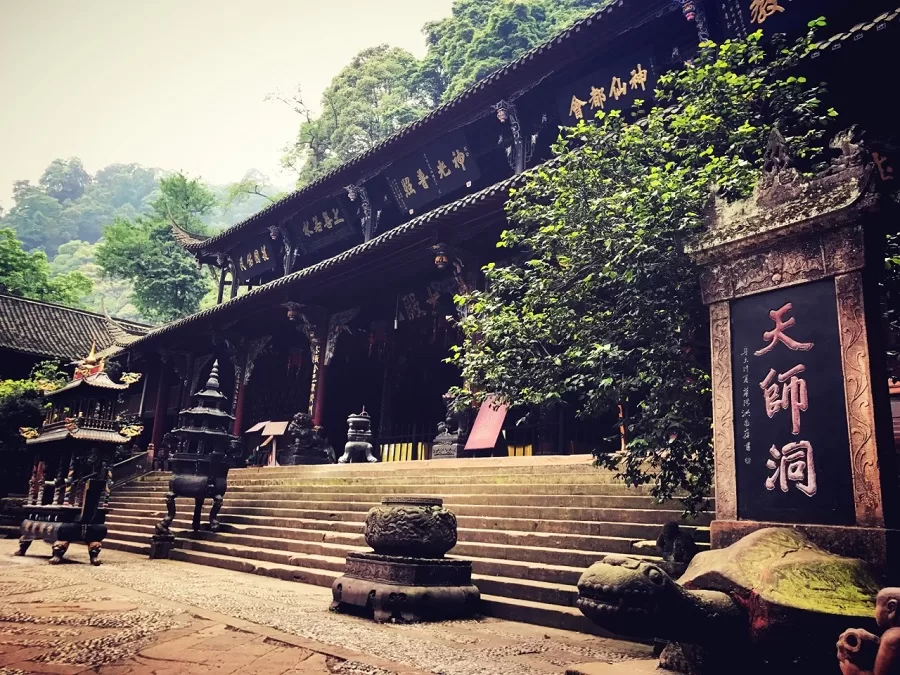
The Front Mountain Scenery of Mount Qingcheng captivates visitors with its breathtaking beauty and cultural landmarks. Walking along the scenic paths, one is greeted by lush forests, serene courtyards, and stunning vistas. The Jianfu Palace, a prominent Taoist temple, stands as a testament to the mountain’s spiritual significance. Intricate carvings, graceful architecture, and tranquil gardens create a harmonious atmosphere. Other highlights include the Shangqing Palace and Tianshi Cave, which offer captivating views and insights into Taoist traditions.
Back Mountain Hiking
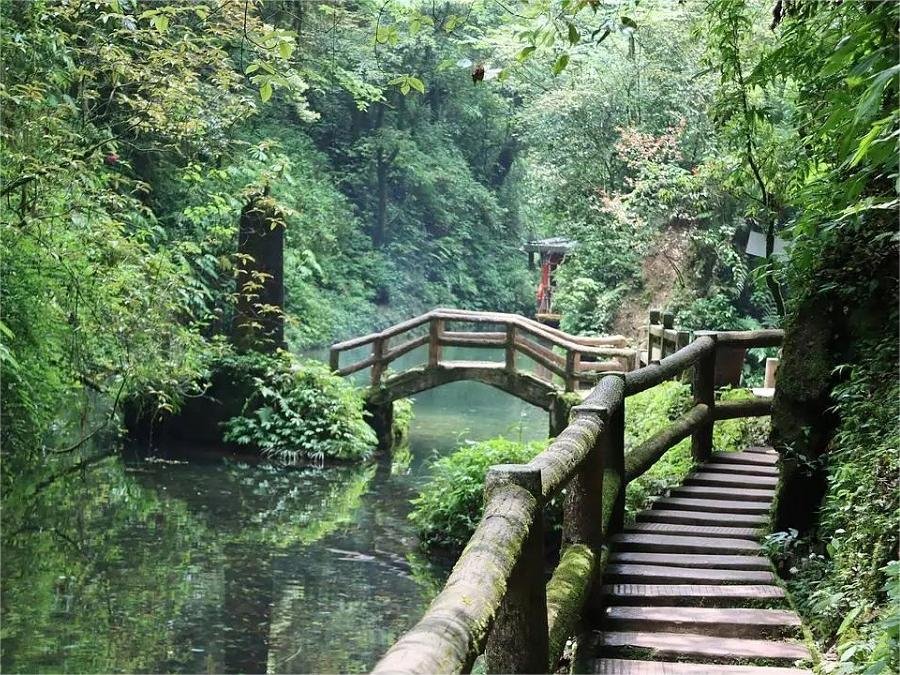
For adventurous souls, the Back Mountain of Mount Qingcheng offers exhilarating hiking opportunities amidst its rugged and captivating landscapes. The hiking trails wind through dense forests, hidden valleys, and babbling streams, providing a sense of serenity and connection with nature. As you ascend, you’ll be rewarded with panoramic views of the surrounding mountains and lush greenery. The journey may lead you to the tranquil Cuiying Lake, where you can immerse yourself in the refreshing ambiance. Back Mountain Hiking in Mount Qingcheng is a thrilling experience that allows you to explore the untamed beauty of the mountain while challenging your physical and mental prowess.
Sources d'eau chaude

Nestled amidst the tranquil surroundings of Mount Qingcheng, the natural hot springs provide a soothing and rejuvenating experience for visitors. Known for their therapeutic properties, the hot springs offer a respite from the stresses of everyday life. Surrounded by lush greenery and breathtaking landscapes, immersing oneself in the warm, mineral-rich waters is a perfect way to relax and unwind. The hot springs of Mount Qingcheng provide a blissful retreat, allowing visitors to indulge in a serene and healing experience while basking in the natural beauty of the mountain.
Cultural Festivals
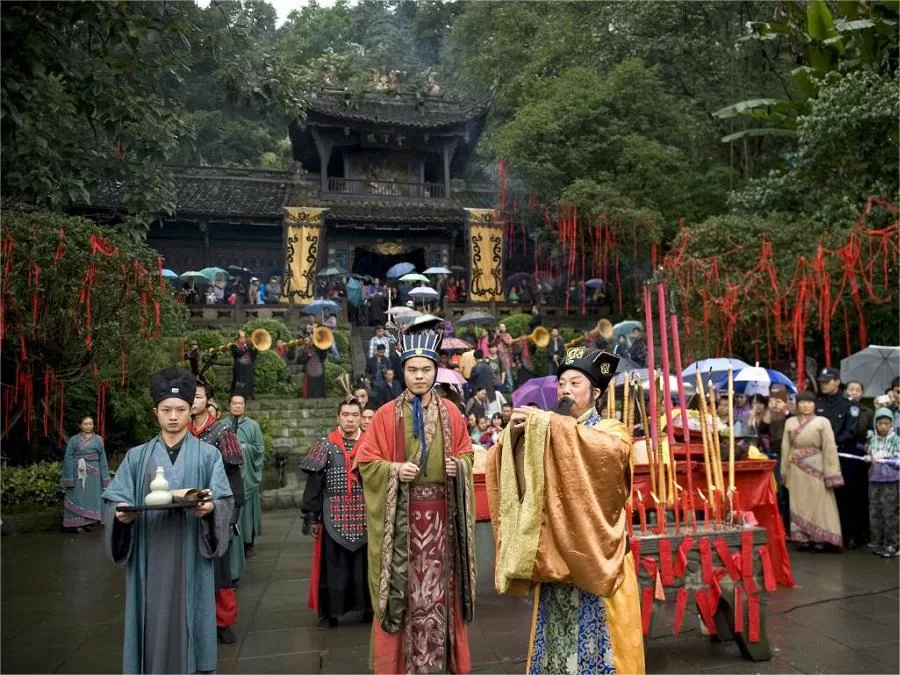
Throughout the year, Mount Qingcheng hosts vibrant cultural festivals that showcase the rich traditions and heritage of the region. These festivals provide a unique opportunity for visitors to immerse themselves in the local culture and experience lively celebrations. From Taoist rituals to traditional performances, the festivals offer a captivating glimpse into the customs and practices of the area. Whether it’s witnessing colorful processions, participating in Taoist ceremonies, or enjoying traditional music and dance, the cultural festivals of Mount Qingcheng create a vibrant and joyful atmosphere, leaving visitors with lasting memories of the cultural diversity and spirit of the mountain.
Vlog about Mount Qingcheng
Conseils utiles tirés d'avis authentiques
Avoid Walking Down the Mountain Path: It’s advised not to take the mountain path down as about one-third of the journey is covered in old stone paths that have become uneven and difficult to traverse. Especially when descending, the narrow and challenging conditions make it less preferable.
Get a Reliable Map: The official notice board maps in the area might be unclear due to constant poking, making it difficult to identify the next location. It’s recommended to either find a reliable map of Qingcheng Mountain in advance or spend a small fee to purchase one (around 5 yuan).
Explore the Front Mountain Strategically: When exploring the front mountain, it’s suggested to go up following the left route and get down following the right route. The scenic views on the front mountain are mostly on the left side along the route, while the right side has fewer notable attractions.
Utilize the Shuttle Bus: For transportation to and from the mountain gate and the high-speed rail station, it’s strongly recommended to use the shuttle bus. Walking back and forth might take around one and a half hours. The shuttle bus is available just across the road from the high-speed rail station, and the official round trip fare is 35 yuan. Other forms of transportation are not recommended as regular vehicles are not allowed inside.
Attractions near Mount Qingcheng
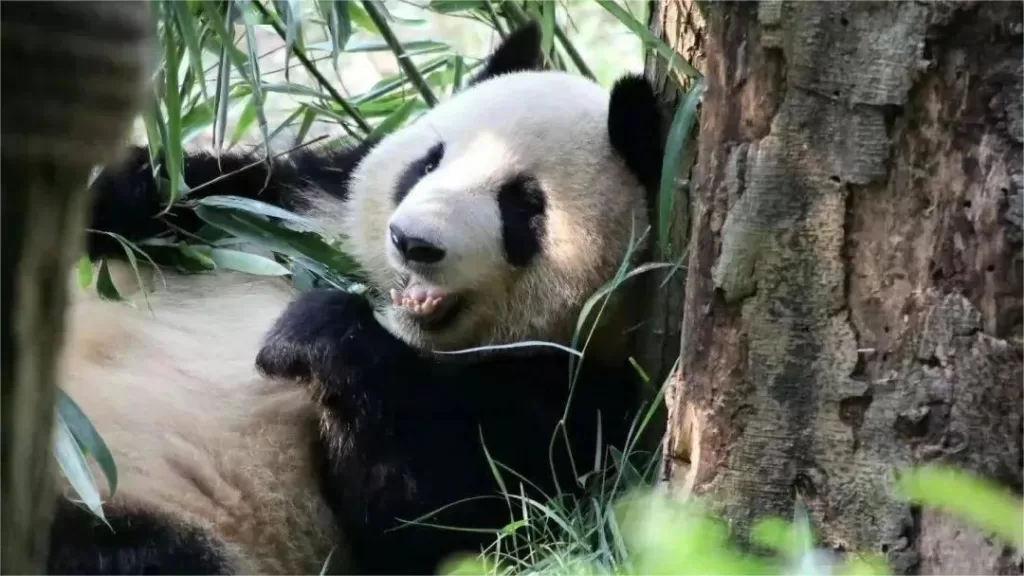
Dujiangyan Panda Base - Un centre d'élevage avec plus de 50 pandas
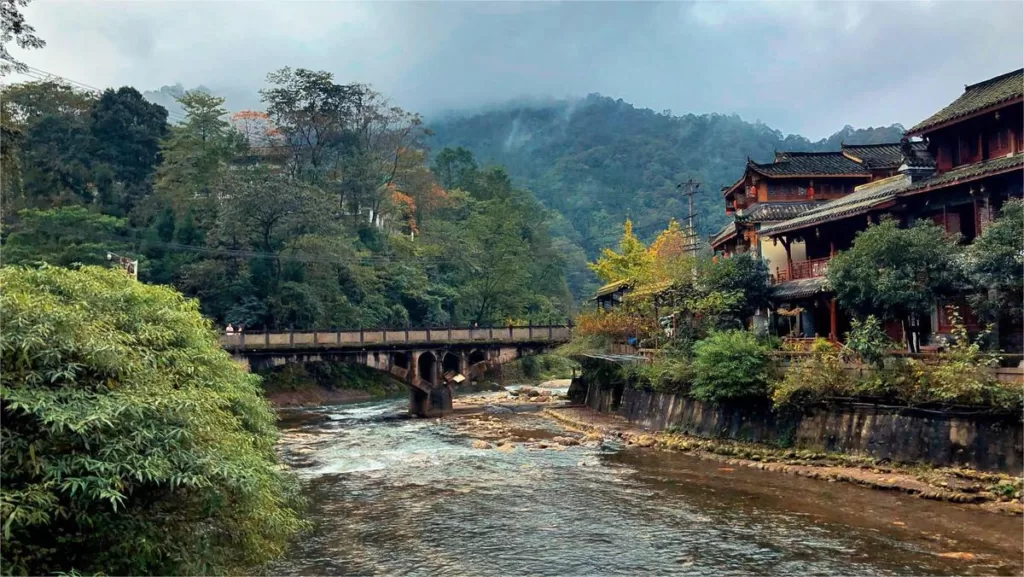
Qingcheng Back Mountain - Une destination majestueuse et sereine

Dujiangyan - L'une des plus grandes réalisations techniques de la Chine ancienne
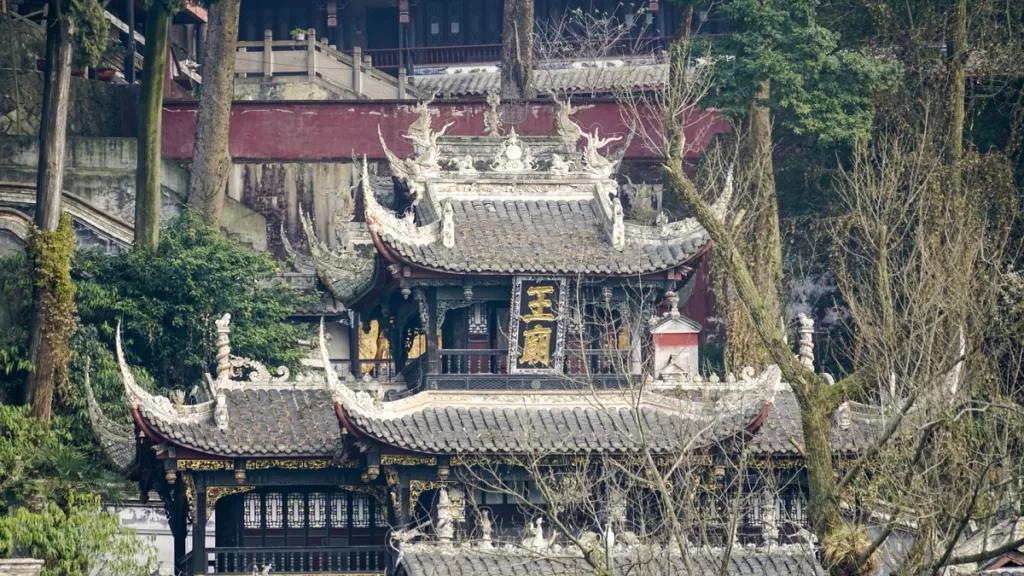
Erwang Temple – In hornor of the architecturer of Dujiangyan
Attractions de Chengdu, Paysages du Sichuan, Site du patrimoine mondial de l'UNESCO